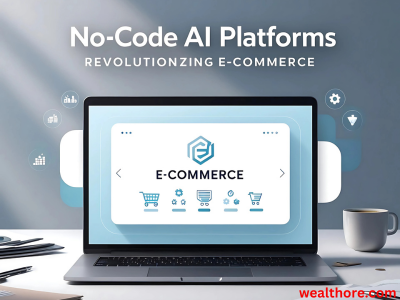The rise of artificial intelligence (AI) has transformed numerous industries, with e-commerce being no exception. In this fast-paced, tech-driven landscape, startups face an ongoing challenge: how to leverage advanced technologies like AI without incurring massive costs or requiring deep technical expertise. For many small businesses, the dream of integrating AI seemed distant—until no-code AI platforms entered the scene. These platforms make it possible for anyone to use AI-powered tools and applications without writing a single line of code, fundamentally changing how e-commerce startups operate.
In this article, we will explore the potential of no-code AI platforms, their key applications in e-commerce, why they are essential for startups, and how to choose the right platform. We’ll also dive into some of the most popular no-code AI platforms that are helping e-commerce startups grow and thrive in today’s competitive market.
What Are No-Code AI Platforms?
No-code AI platforms are software tools that allow users to create, implement, and manage AI models without having to engage in any coding. These platforms usually feature intuitive drag-and-drop interfaces, pre-built templates, and tutorials, making them accessible to individuals and teams without technical backgrounds. The goal of these platforms is to democratize AI, giving startups the ability to harness powerful technologies without the need for an in-house developer team or a large budget.
For e-commerce startups, this means access to tools that can automate processes, enhance customer experiences, and optimize business operations, all while saving time and resources.
How No-Code AI Works
Most no-code AI platforms offer a visual approach to building models, meaning users can design workflows by selecting predefined components, such as data sources, machine learning algorithms, or outcome variables. These platforms come pre-packaged with ready-made AI models, and users can customize them based on their needs. The simplicity of no-code AI platforms allows even those without a technical background to deploy solutions in areas like sales forecasting, personalized marketing, and customer support automation.
Why E-Commerce Startups Should Consider No-Code AI
1. Cost-Effectiveness
Traditional AI development can be expensive. Building custom AI models from scratch requires hiring skilled developers and data scientists, in addition to purchasing expensive software or cloud services. No-code AI platforms eliminate these costs, providing an affordable entry point for startups that need to keep their budgets in check. These platforms allow businesses to adopt AI technology without the overhead costs associated with building and maintaining a technical team.
2. Speed and Agility
E-commerce is an industry that thrives on speed—whether it’s launching a new marketing campaign, adjusting product prices, or addressing customer inquiries. With no-code AI platforms, startups can create and deploy AI solutions quickly. The drag-and-drop interfaces and pre-built templates mean that businesses don’t have to wait for lengthy development processes or deal with coding bottlenecks. Startups can move swiftly to respond to consumer demand or capitalize on new market trends, which is crucial in staying ahead of the competition.
3. Accessibility and Usability
One of the most significant benefits of no-code AI is accessibility. These platforms are designed with non-technical users in mind. Anyone from the marketing department to customer service representatives can create AI-driven solutions, fostering a culture of innovation across different teams within a startup. This ease of use levels the playing field, allowing smaller e-commerce businesses to compete with more established companies by deploying cutting-edge AI tools without needing technical skills.
4. Scalability
As startups grow, so do their AI needs. No-code AI platforms are designed to scale with businesses, allowing them to adjust and expand their AI capabilities as required. Startups can begin with simple AI models and scale up to more complex solutions as their data needs grow. The flexibility of these platforms ensures that e-commerce businesses can continuously adapt without the need for expensive system overhauls.
Key Applications in E-Commerce
The potential applications of no-code AI in e-commerce are vast. Here are some of the most impactful areas where e-commerce startups can benefit from these platforms:
1. Personalized Shopping Experiences
Personalization is a critical component of e-commerce success, and AI is playing a key role in helping businesses tailor the shopping experience to individual customers. No-code AI platforms enable startups to analyze consumer data and use it to create personalized product recommendations, dynamic pricing strategies, and targeted marketing campaigns. For example, an AI-powered platform can track a customer’s browsing habits and suggest products they are more likely to purchase, significantly increasing the chances of conversion.
2. Inventory Management
Efficient inventory management is a challenge for any e-commerce business. AI can help startups predict demand patterns based on historical data, allowing them to optimize stock levels and reduce the risks of overstocking or stockouts. No-code AI platforms make it simple to integrate these predictive models into existing inventory management systems, helping startups avoid costly inventory errors while maximizing efficiency.
3. Customer Support Automation
AI-powered chatbots and virtual assistants can manage a high volume of customer inquiries quickly and effectively, ensuring that customer support remains available 24/7. Startups can use no-code platforms to deploy these AI solutions without the need for extensive development. This not only improves customer satisfaction but also frees up human resources to focus on more complex or value-driven tasks.
4. Fraud Detection
In the e-commerce world, security is paramount. AI can detect fraudulent activity by identifying unusual patterns in customer behavior, such as multiple transactions from the same account within a short period or suspicious login attempts. No-code AI platforms can help startups quickly deploy fraud detection models, keeping customer data secure and protecting the business from financial loss.
Popular No-Code AI Platforms for E-Commerce Startups
As more startups embrace no-code AI solutions, a variety of platforms have emerged to meet the growing demand. Here are some of the most popular no-code AI platforms specifically suited for e-commerce startups:
1. Bubble
Bubble is a highly versatile no-code platform that allows startups to build AI-driven web applications without any coding knowledge. It supports integration with AI tools for features such as personalized shopping experiences and customer service automation. Its flexibility makes it an excellent choice for e-commerce startups looking to create custom AI solutions.
2. Shopify’s Kit
Shopify’s Kit is a no-code AI platform tailored specifically for e-commerce. It helps small businesses optimize their marketing efforts by automatically sending personalized emails, running targeted ads, and making product recommendations based on customer data. Kit simplifies the AI experience for startups by handling much of the heavy lifting associated with marketing automation.
3. Akkio
Akkio is a no-code AI platform focused on sales and marketing analytics. E-commerce startups can use Akkio to analyze customer data, predict trends, and optimize marketing strategies. Its easy-to-use interface makes it a powerful tool for startups that want to harness the power of AI without a technical background.
4. Peltarion
Peltarion is a no-code AI platform that enables users to build, deploy, and scale AI models for various applications, including e-commerce. Startups can use Peltarion to create AI-driven customer support bots, personalized product recommendations, and even fraud detection systems, all without writing code.
5. Apteo
Apteo is another AI platform specifically designed for e-commerce. It uses machine learning to predict customer behavior, helping startups improve their marketing strategies. Apteo allows businesses to create personalized product recommendations and customer engagement strategies, increasing the likelihood of repeat purchases and customer loyalty.
Choosing the Right No-Code AI Platform
When selecting a no-code AI platform, e-commerce startups should take several factors into account:
- Ease of Use: The platform’s interface and overall user experience are critical. Ensure that the platform aligns with your team’s technical capabilities and workflow preferences.
- Features and Integrations: Evaluate the platform’s range of features and its ability to integrate with your existing tools and systems.
- Scalability: Choose a platform that can grow with your business, especially as your AI needs evolve.
- Support and Community: Look for platforms with strong customer support and active user communities, which can be invaluable for troubleshooting and learning.
Conclusion
No-code AI platforms are democratizing access to advanced AI tools, making them accessible to startups that don’t have the technical expertise or financial resources to build AI solutions from scratch. For e-commerce startups, this is a game-changer. From personalized shopping experiences to efficient inventory management, AI can help businesses operate more efficiently, improve customer satisfaction, and ultimately, drive growth.
By choosing the right no-code AI platform, e-commerce startups can unlock the potential of artificial intelligence, positioning themselves to compete in the fast-evolving digital marketplace. Whether you’re looking to personalize your offerings, streamline operations, or enhance customer support, now is the time to explore the possibilities of no-code AI. The future of e-commerce is here—are you ready to embrace it? Visit Wealthore.com or kevweauto.com for expert insights and resources to help you grow your business efficiently.
Don’t forget to leave a comment below!




